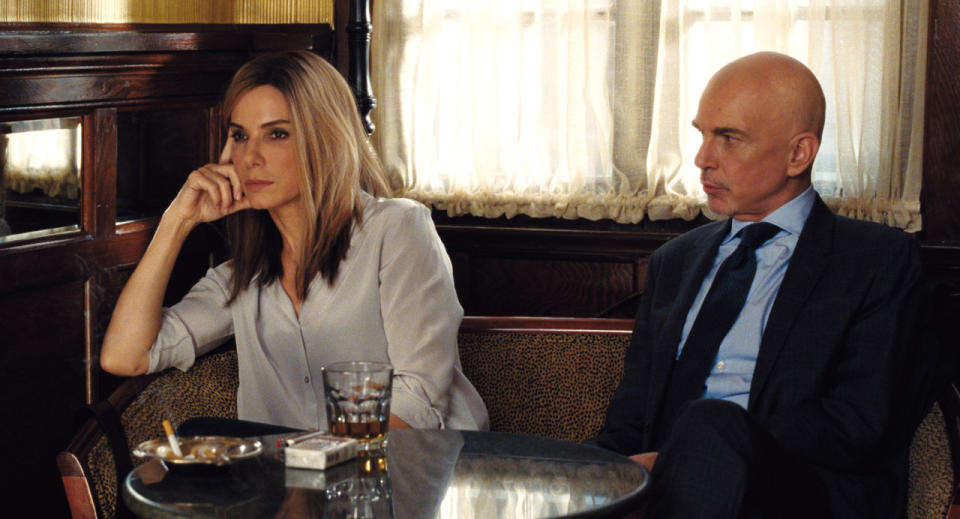Will Angelina Jolie's 'By the Sea' Bomb Mean the End of 'Favor' Movies?

Brad Pitt and Angelina Jolie in ‘By the Sea’ (Merrick Morton/Universal Pictures via AP)
By Tatiana Siegel, The Hollywood Reporter
Angelina Jolie Pitt’s By the Sea offers an art house-style rumination on a failing marriage. Ironically, it provides a more revealing glimpse into the perils of a different type of relationship: the so-called “favor” movie.
For years, Hollywood studios have lined up to back projects with limited commercial appeal as a way of keeping the biggest stars and directors in their fold. Call it the “One for me, one for you” principle. But with the failures of Universal’s By the Sea and Warner Bros.’ Sandra Bullock political drama Our Brand Is Crisis, many believe the major studios will be a bit more hesitant to finance and put their marketing muscle behind a passion project better suited for the specialty marketplace.
In July 2014, in a competitive situation, Universal acquired worldwide rights to By the Sea and set Jolie Pitt (who was finalizing the studio’s Unbroken) to direct and star with husband Brad Pitt, prompting Jolie Pitt to invoke the ‘R’ word. “I am very happy to continue my relationship with Donna and the entire Universal team,” she said at the time, referring to Universal chairman Donna Langley. “They have created a very special place for storytellers.”
Related: Box Office: How Star Power Couldn’t Save Angelina Jolie Pitt’s 'By the Sea’
But now the studio stands to lose as much as $40 million on By the Sea, according to two knowledgeable sources who place the film’s budget at closer to $25 million than the $10 million Universal insists it cost (and the marketing expense at $15 million). The film grossed $185,000 from 126 theaters in its second week of release and has amassed a paltry domestic haul of $313,000 so far. One source scoffs at the $10 million figure, noting that Jolie Pitt’s directorial debut, In the Land of Blood and Honey, a Serbian-language war film with a no-name cast, cost $13 million.
And if By the Sea’s poor reviews and low-appeal concept wasn’t enough to damage the film’s box-office prospects, the marketing sealed its fate. “If you have two of the hottest movie stars on the planet, you might want to put them on the poster,” says Rentrak analyst Paul Dergarabedian. Behind the scenes, Jolie Pitt instead fought to use a one-sheet featuring two hats. “Universal wanted to sell it as something sexy, but she wanted it to be sold as a European art house movie,” says an insider. “Every trailer and TV spot was cut by her or her group.” The move ultimately will backfire on Jolie Pitt and Pitt, who each is said to have taken $1.5 million upfront in exchange for a hefty backend that never will materialize.
But even if Universal loses tens of millions of dollars on By the Sea, the studio is gambling that by backing Jolie Pitt’s artistic whim, she will be amenable to starring in its tentpole Bride of Frankenstein from producer Brian Grazer or a long-hoped-for sequel to Wanted. Either of those films could end up raking in far more in profits than Universal will lose on By the Sea. “Following our successful collaboration with Angie on Unbroken, we jumped at the opportunity to work with her again,” says a studio rep in a statement. “Her script and vision for an intelligent and sophisticated film appealed to us, and we wanted to be part of it.”
Related: 'By the Sea’: AFI Fest Review

Sandra Bullock and Billy Bob Thornton in ‘Our Brand Is Crisis’ (Warner Bros. Pictures via AP)
Likewise, Warner Bros. will take a significant loss on Crisis — starring Bullock and produced by George Clooney’s Smokehouse — which cost $28 million to make and has earned a feeble $6.9 million as of Nov. 20. Despite poor reviews at the Toronto Film Festival in September, Warners is said to have spent about $40 million to market the film. (The blow to the studio was softened by financial partners Participant and RatPac-Dune). In offering an explanation for the disaster, marketing chief Sue Kroll also underscored the relationship factor. “We cherish our relationship with her,” said Kroll of Bullock. “Ultimately, neither the concept of the story nor our campaign connected with moviegoers.”
Even with Bullock in the lead, the film probably was a better fit for the indie-financed model, as has been the case with many of Crisis director David Gordon Green’s films. But Warners was looking to curry favor with both Bullock and Clooney, who co-starred in the studio’s megahit Gravity. And the studio has been courting Bullock for a female-centric Ocean’s Eleven reboot that Clooney would produce.
Paramount, too, invoked the relationship raison d'etre when explaining Michael Bay’s 2013 bodybuilding passion project Pain and Gain, which wasn’t a disaster but which grossed far less than his usual big-budget fare. Bay, who has made Paramount billions of dollars with the Transformers franchise, also was given a long leash on his Benghazi movie 13 Hours (Jan. 15), and the film still may end up a hit. “We’ve had an amazing relationship with Michael Bay,” Paramount vice chair Rob Moore recently told THR. “And this is a story he was excited to tell.” Therefore, a wide-release movie with a relatively unknown cast about an overseas siege with politically divisive implications could be justified. (A Paramount source insists that the studio was bent on making the film even before Bay stepped in.)
Watch the ‘By the Sea’ trailer:
Related: Angelina Jolie, Brad Pitt Talk “Challenging” 'By the Sea’: “It’s Not Autobiographical”
Perhaps the biggest blow to the studio favor film happened earlier this year when Amy Pascal stepped down from her top post at Sony. Pascal long had been a champion of the back-scratcher, including the 2013 debacle After Earth, a film that was intended to make Jaden Smith a star like his father, Will Smith. As with By the Sea, the elder Smith pushed back on Sony’s marketing campaign that originally played up his image. The final poster for the $130 million film instead used a split face of the father and son, leaving one of the world’s biggest stars barely recognizable.
“With these types of movies, you’re not swinging for the box-office fence,” adds Dergarabedian. “You’re swinging for the relationship-building fence and looking toward the future. Passion projects are a way to play chess with your stars. It’s the 10-year plan for these studios, not the one-weekend plan.”
But are studio relationships key to or killing Hollywood? As marketing expenses skyrocket for even modestly budgeted movies and studios make fewer homegrown films, many say the leverage has shifted away from stars. Plus, some of the best examples of passion projects that have worked were self-financed, like Mel Gibson’s The Passion of the Christ ($612 million worldwide) and Magic Mike (star Channing Tatum and director Steven Soderbergh put up the $7 million budget for the film that earned $167 million worldwide).
Notes one producer who has worked with many of the above names, “The need to do favors doesn’t make sense anymore.”

